| Listing 1 - 10 of 53 | << page >> |
Sort by
|
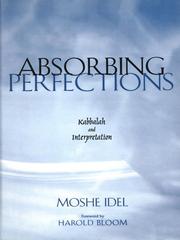
ISBN: 1281734861 9786611734862 0300135076 9780300135077 9781281734860 0300083793 9780300083798 Year: 2002 Publisher: New Haven Yale University Press
Abstract | Keywords | Export | Availability | Bookmark
 Loading...
Loading...Choose an application
- Reference Manager
- EndNote
- RefWorks (Direct export to RefWorks)
In this wide-ranging discussion of Kabbalah-from the mystical trends of medieval Judaism to modern Hasidism-one of the world's foremost scholars considers different visions of the nature of the sacred text and of the methods to interpret it. Moshe Idel takes as a starting point the fact that the postbiblical Jewish world lost its geographical center with the destruction of the temple and so was left with a textual center, the Holy Book. Idel argues that a text-oriented religion produced language-centered forms of mysticism.Against this background, the author demonstrates how various Jewish mystics amplified the content of the Scriptures so as to include everything: the world, or God, for example. Thus the text becomes a major realm for contemplation, and the interpretation of the text frequently becomes an encounter with the deepest realms of reality. Idel delineates the particular hermeneutics belonging to Jewish mysticism, investigates the progressive filling of the text with secrets and hidden levels of meaning, and considers in detail the various interpretive strategies needed to decodify the arcane dimensions of the text.
Cabala --- History. --- Bible. --- Chumash --- Five Books of Moses --- Ḥamishah ḥumshe Torah --- Ḥumash --- Kitāb-i Muqqadas --- Mose Ogyŏng (Book of the Old Testament) --- Pentateuch --- Pi︠a︡toknizhīe Moiseevo --- Sefer Ḥamishah ḥumshe Torah --- Tawrāh --- Torà (Pentateuch) --- Torah (Pentateuch) --- Tʻoris xutʻcigneuli --- Ureta --- תורה --- Haftarot --- Criticism, interpretation, etc., Jewish. --- Kabbale --- Histoire
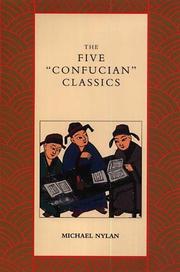
ISBN: 128172243X 9786611722432 0300130333 9780300130331 9781281722430 9780300081855 0300081855 9780300212006 0300212003 6611722432 Year: 2001 Publisher: New Haven: Yale university press,
Abstract | Keywords | Export | Availability | Bookmark
 Loading...
Loading...Choose an application
- Reference Manager
- EndNote
- RefWorks (Direct export to RefWorks)
The Five Classics associated with Confucius formed the core curriculum in the education of Chinese literati throughout most of the imperial period. In this book Michael Nylan offers a sweeping assessment of these ancient texts and shows how their influence spread across East Asia. Nylan begins by tracing the formation of the Five Classics canon in the pre-Han and Han periods, 206 B.C. to A.D. 220, revising standard views on the topic. She assesses the impact on this canon of the invention of a rival corpus, The Four Books, in the twelfth century. She then analyses each of the Five Classics, discussing when they were written, how they were transmitted and edited in later periods, and what political, historical, and ethical themes were associated with them through the ages. Finally she deliberates on the intertwined fates of Confucius and the Five Classics over the course of the twentieth century and shows how their contents are relevant to much newer concerns.
BODY, MIND & SPIRIT / I Ching. --- Wu jing. --- 五經 --- Wu ching --- Woo king --- Five Classics --- Ogyŏng --- Wu jing quan yi --- 五经 --- S12/0300 --- 299.512 --- 299.512 Confucianisme. Mencius. I Ching --- Confucianisme. Mencius. I Ching --- China: Philosophy and Classics--Confucian classics --- Philosophy, Confucian.
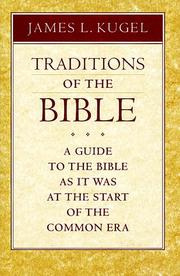
ISBN: 0674039769 9780674039766 9780674791510 0674791517 Year: 2022 Publisher: Cambridge, MA
Abstract | Keywords | Export | Availability | Bookmark
 Loading...
Loading...Choose an application
- Reference Manager
- EndNote
- RefWorks (Direct export to RefWorks)
James Kugel's The Bible As It Was (1997) has been welcomed with universal praise. Here now is the full scholarly edition of this wonderfully rich and illuminating work, expanding the author's findings into an incomparable reference work. Focusing on two dozen core stories in the Pentateuch--from the Creation and Tree of Knowledge through the Exodus from Egypt and journey to the Promised Land--James Kugel shows us how the earliest interpreters of the scriptures radically transformed the Bible and made it into the book that has come down to us today. Kugel explains how and why the writers of this formative age of interpretation--roughly 200 B.C.E. to 150 C.E.--assumed such a significant role. Mining their writings--including the Dead Sea Scrolls, works of Philo and Josephus and letters of the Apostle Paul, and writings of the Apostolic Fathers and the rabbinic Sages--he "es for us the seminal passages that uncover this crucial interpretive process. For this full-scale reference work Kugel has added a substantial treasury of sources and passages for each of the 24 Bible stories. It will serve as a unique guide and sourcebook for biblical interpretation.
Theology. --- Christian theology --- Theology --- Theology, Christian --- Christianity --- Religion --- Bible. --- Chumash --- Five Books of Moses --- Ḥamishah ḥumshe Torah --- Ḥumash --- Kitāb-i Muqqadas --- Mose Ogyŏng (Book of the Old Testament) --- Pentateuch --- Pi︠a︡toknizhīe Moiseevo --- Sefer Ḥamishah ḥumshe Torah --- Tawrāh --- Torà (Pentateuch) --- Torah (Pentateuch) --- Tʻoris xutʻcigneuli --- Ureta --- תורה --- Haftarot --- Criticism, interpretation, etc. --- History. --- 22.01 --- Bijbel:--inleiding
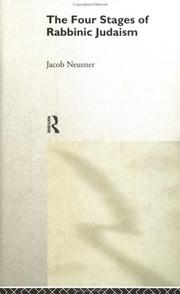
ISBN: 1134646496 1280333847 0203012283 9780203012284 9780415195300 0415195306 9780415195317 0415195314 0415195306 0415195314 9781134646449 9781134646487 9781134646494 1134646488 9781280333842 Year: 1999 Publisher: London New York Routledge
Abstract | Keywords | Export | Availability | Bookmark
 Loading...
Loading...Choose an application
- Reference Manager
- EndNote
- RefWorks (Direct export to RefWorks)
This concise volume provides a lucid introduction to the genesis and development of Rabbinic Judaism.Jacob Neusner outlines and examines the four stages in which the initial period of the historical development of Rabbinic Judaism divides, beginning with the Pentateuch and ending with its definitive and normative statement in the Talmud of Babylonia. He traces the development of Rabbinic Judaism by exploring the relationships between and among the cognate writings which embody its formative history.
Judaism --- Rabbinical literature --- History --- History and criticism. --- Bible. --- Chumash --- Five Books of Moses --- Ḥamishah ḥumshe Torah --- Ḥumash --- Kitāb-i Muqqadas --- Mose Ogyŏng (Book of the Old Testament) --- Pentateuch --- Pi︠a︡toknizhīe Moiseevo --- Sefer Ḥamishah ḥumshe Torah --- Tawrāh --- Torà (Pentateuch) --- Torah (Pentateuch) --- Tʻoris xutʻcigneuli --- Ureta --- תורה --- Haftarot --- Theology.
Book
ISBN: 1315539233 1134945868 178179006X 9781134945863 9781315539232 9781134946006 1134946007 9781134945931 1134945930 1845536843 9781845536848 9781845536855 1845536851 9781845536848 Year: 2014 Publisher: Milton Park, Abingdon, Oxon
Abstract | Keywords | Export | Availability | Bookmark
 Loading...
Loading...Choose an application
- Reference Manager
- EndNote
- RefWorks (Direct export to RefWorks)
Opening the Books of Moses presents an introduction to the first five books of the Bible. It is written for any student engaged in the scholarly study of these most central of biblical texts. The aim throughout is to examine the books with a view to illuminating the ideas, beliefs and experiences of the time. This broad overview provides: a survey of the current state of Pentateuchal research; an analysis of how the texts were shaped by their time and audience; an outline of Jewish areas in the Persian period; the study concludes with an analysis of key concerns in the study of the Pentateuch, notably the Torah, geography, ethnicity, the nature of Yahweh and other deities, theories of cult, treaties and oaths, and Moses himself.
Bible. --- Chumash --- Five Books of Moses --- Ḥamishah ḥumshe Torah --- Ḥumash --- Kitāb-i Muqqadas --- Mose Ogyŏng (Book of the Old Testament) --- Pentateuch --- Pi︠a︡toknizhīe Moiseevo --- Sefer Ḥamishah ḥumshe Torah --- Tawrāh --- Torà (Pentateuch) --- Torah (Pentateuch) --- Tʻoris xutʻcigneuli --- Ureta --- תורה --- Haftarot --- Criticism, interpretation, etc.
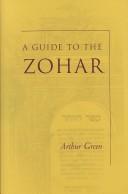
ISBN: 0804782911 9780804782913 0804749078 9780804749077 0804749086 9780804749084 Year: 2004 Publisher: Stanford, California
Abstract | Keywords | Export | Availability | Bookmark
 Loading...
Loading...Choose an application
- Reference Manager
- EndNote
- RefWorks (Direct export to RefWorks)
The Zohar is the great medieval compendium of Jewish esoteric and mystical teaching, and the basis of the kabbalistic faith. It is, however, a notoriously difficult text, full of hidden codes, concealed meanings, obscure symbols, and ecstatic expression. This illuminating study, based upon the last several decades of modern Zohar scholarship, unravels the historical and intellectual origins of this rich text and provides an excellent introduction to its themes, complex symbolism, narrative structure, and language. A Guide to the Zohar is thus an invaluable companion to the Zohar itself, as well as a useful resource for scholars and students interested in mystical literature, particularly that of the west, from the Middle Ages to the present.
Cabala --- Bible. --- Chumash --- Five Books of Moses --- Ḥamishah ḥumshe Torah --- Ḥumash --- Kitāb-i Muqqadas --- Mose Ogyŏng (Book of the Old Testament) --- Pentateuch --- Pi︠a︡toknizhīe Moiseevo --- Sefer Ḥamishah ḥumshe Torah --- Tawrāh --- Torà (Pentateuch) --- Torah (Pentateuch) --- Tʻoris xutʻcigneuli --- Ureta --- תורה --- Haftarot
Book
ISBN: 1589836111 9781589836112 9781589839991 1589839994 1589835646 9781589835641 Year: 2011 Publisher: Atlanta: Society of biblical literature,
Abstract | Keywords | Export | Availability | Bookmark
 Loading...
Loading...Choose an application
- Reference Manager
- EndNote
- RefWorks (Direct export to RefWorks)
Women in the Bible. --- Bible. --- Feminist criticism. --- Chumash --- Five Books of Moses --- Ḥamishah ḥumshe Torah --- Ḥumash --- Kitāb-i Muqqadas --- Mose Ogyŏng (Book of the Old Testament) --- Pentateuch --- Pi︠a︡toknizhīe Moiseevo --- Sefer Ḥamishah ḥumshe Torah --- Tawrāh --- Torà (Pentateuch) --- Torah (Pentateuch) --- Tʻoris xutʻcigneuli --- Ureta --- תורה --- Haftarot --- Bible --- Bible and feminism --- Feminist criticism
Book
ISBN: 083077291X 9780830772919 9780830772230 0830772235 Year: 2018 Publisher: Colorado Springs, CO
Abstract | Keywords | Export | Availability | Bookmark
 Loading...
Loading...Choose an application
- Reference Manager
- EndNote
- RefWorks (Direct export to RefWorks)
Bible. --- Chumash --- Five Books of Moses --- Ḥamishah ḥumshe Torah --- Ḥumash --- Kitāb-i Muqqadas --- Mose Ogyŏng (Book of the Old Testament) --- Pentateuch --- Pi︠a︡toknizhīe Moiseevo --- Sefer Ḥamishah ḥumshe Torah --- Tawrāh --- Torà (Pentateuch) --- Torah (Pentateuch) --- Tʻoris xutʻcigneuli --- Ureta --- תורה --- Haftarot
Book
ISBN: 1498228623 9781498228626 1498228615 9781498228619 9781498228633 1498228631 Year: 2016 Publisher: Eugene, Oregon
Abstract | Keywords | Export | Availability | Bookmark
 Loading...
Loading...Choose an application
- Reference Manager
- EndNote
- RefWorks (Direct export to RefWorks)
Every generation must accept the responsibility of training the next. Yet, are modern Christian pastors and educators using teaching paradigms that impact memory and long-term memory retention? Pedagogical Theory of the Hebrew Bible is a cross-disciplinary book that connects religious education with active learning theory and demonstrates how these two areas are intimately connected within the biblical texts of Genesis through 2 Kings. Through vivid discussion of the literary texts, Adrian Hinkle demonstrates that religious educators never used isolated oral stories or instructions. Instead, t
Bible. --- Historical Books (Books of the Old Testament) --- Chumash --- Five Books of Moses --- Ḥamishah ḥumshe Torah --- Ḥumash --- Kitāb-i Muqqadas --- Mose Ogyŏng (Book of the Old Testament) --- Pentateuch --- Pi︠a︡toknizhīe Moiseevo --- Sefer Ḥamishah ḥumshe Torah --- Tawrāh --- Torà (Pentateuch) --- Torah (Pentateuch) --- Tʻoris xutʻcigneuli --- Ureta --- תורה --- Haftarot --- Study and teaching.
Book
ISBN: 0827613253 0827612982 9780827613256 9780827612624 0827612621 9780827612983 Year: 2016 Publisher: Philadelphia Lincoln
Abstract | Keywords | Export | Availability | Bookmark
 Loading...
Loading...Choose an application
- Reference Manager
- EndNote
- RefWorks (Direct export to RefWorks)
Jewish philosophy. --- Jews --- Philosophy, Jewish --- Philosophy, Israeli --- Philosophy --- Bible. --- Chumash --- Five Books of Moses --- Ḥamishah ḥumshe Torah --- Ḥumash --- Kitāb-i Muqqadas --- Mose Ogyŏng (Book of the Old Testament) --- Pentateuch --- Pi︠a︡toknizhīe Moiseevo --- Sefer Ḥamishah ḥumshe Torah --- Tawrāh --- Torà (Pentateuch) --- Torah (Pentateuch) --- Tʻoris xutʻcigneuli --- Ureta --- תורה --- Haftarot --- Criticism, interpretation, etc.
| Listing 1 - 10 of 53 | << page >> |
Sort by
|

 Search
Search Feedback
Feedback About UniCat
About UniCat  Help
Help News
News